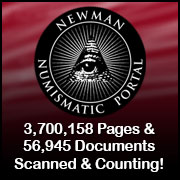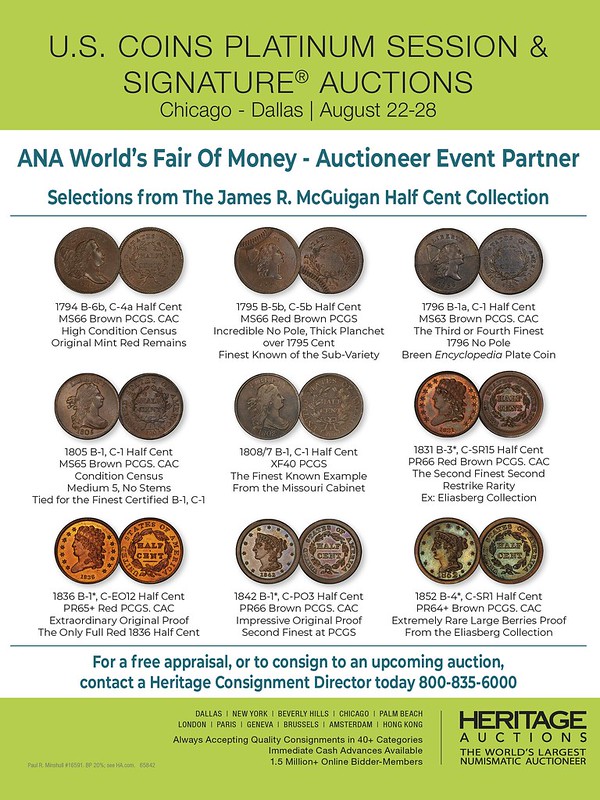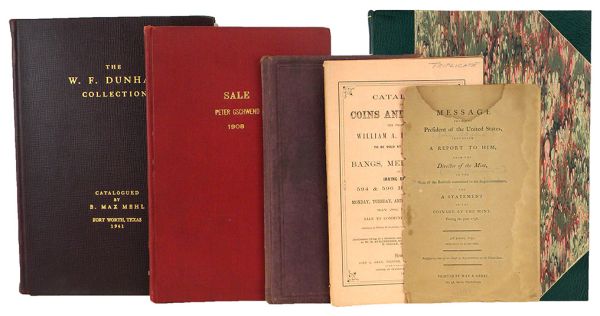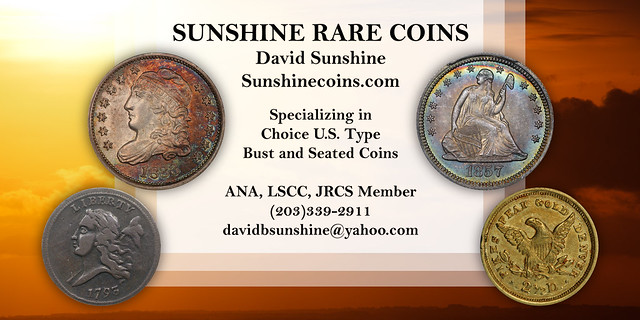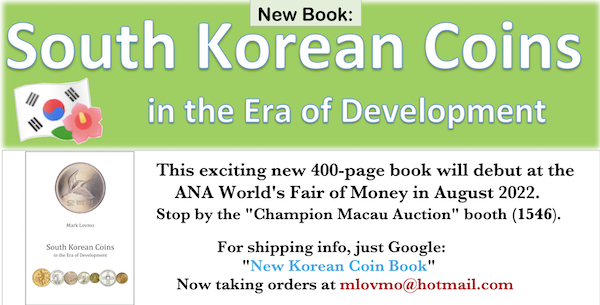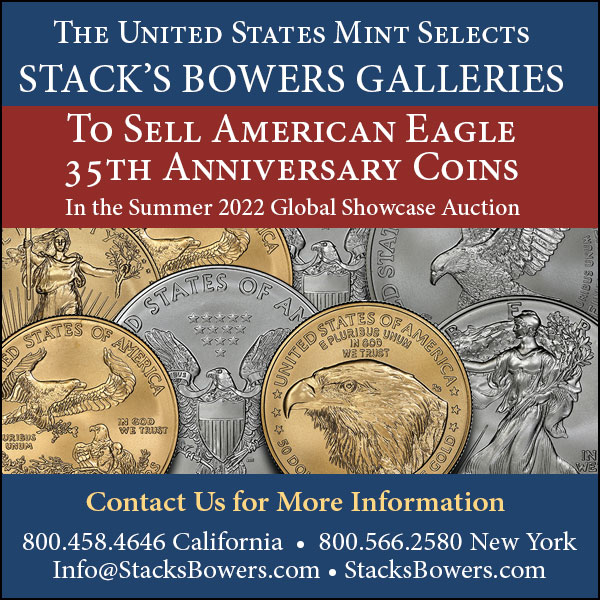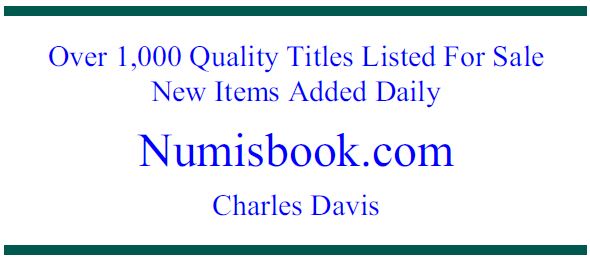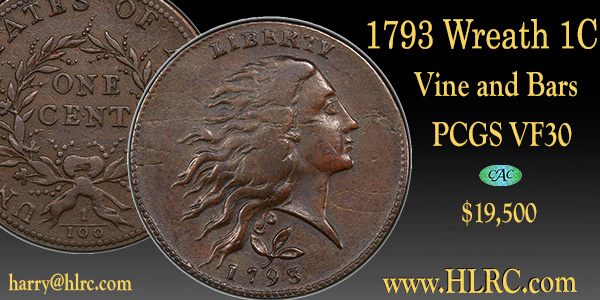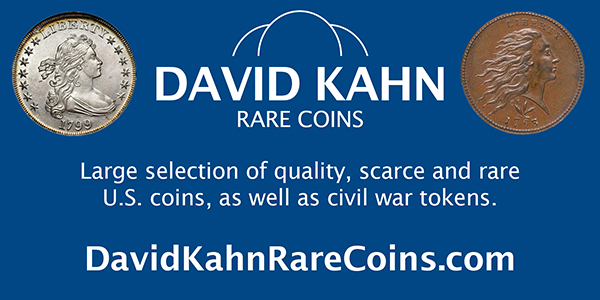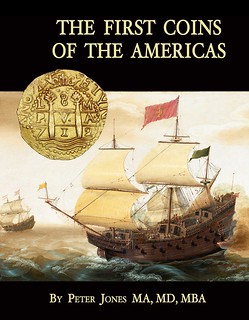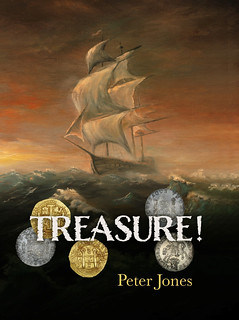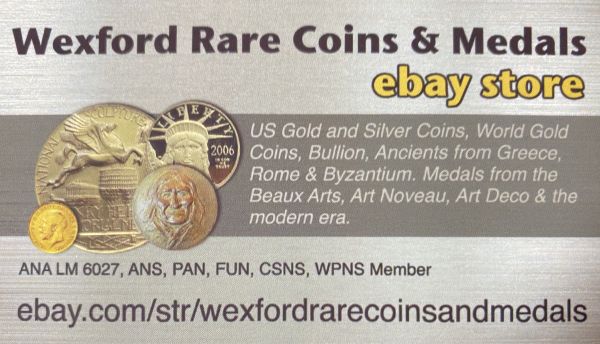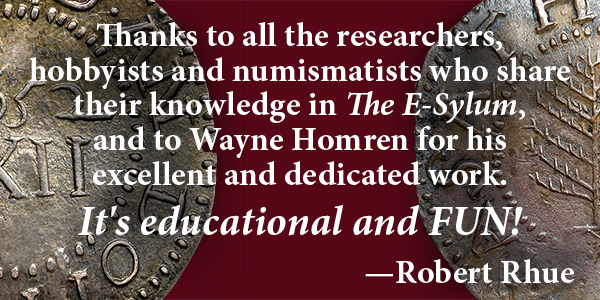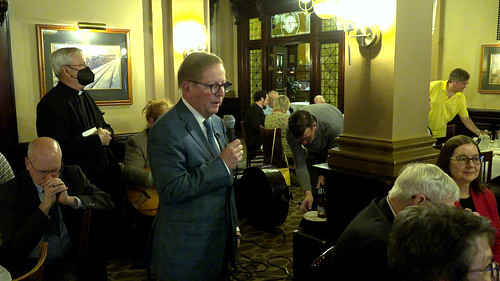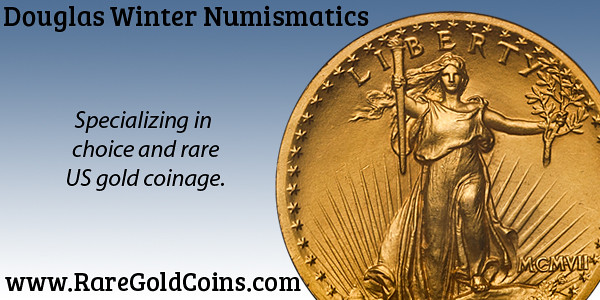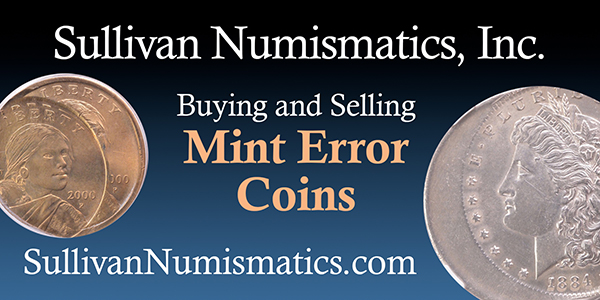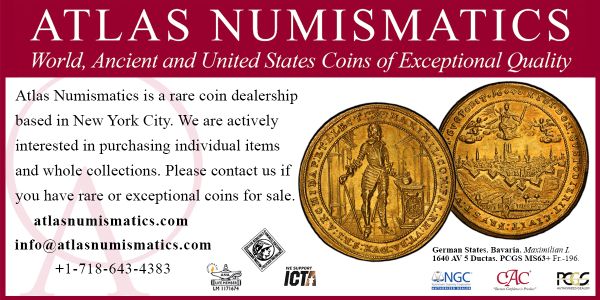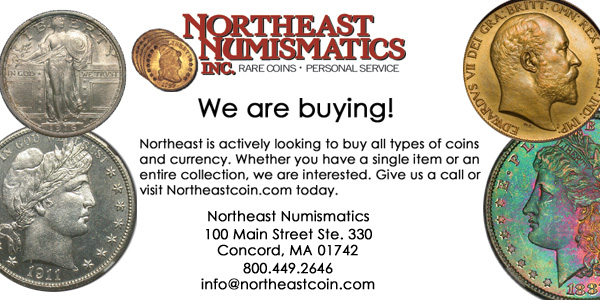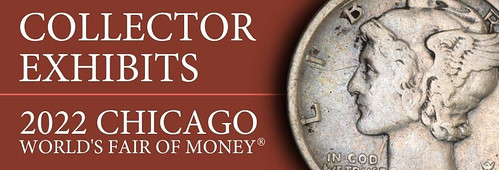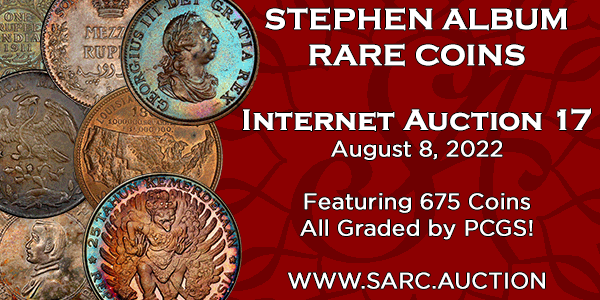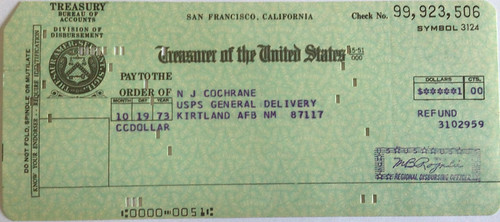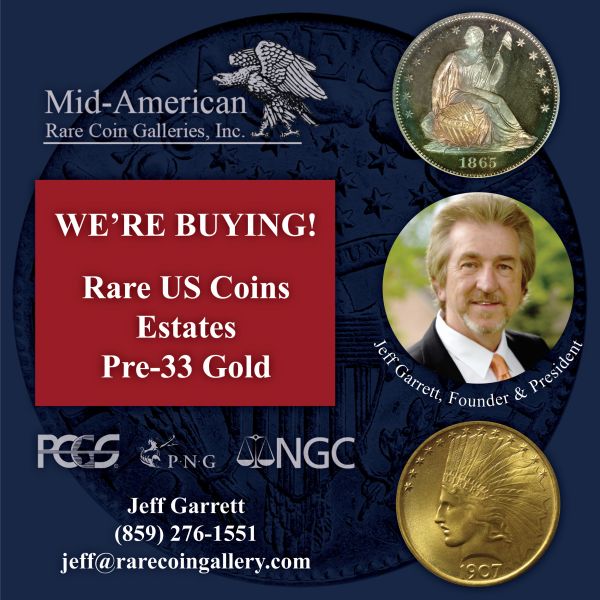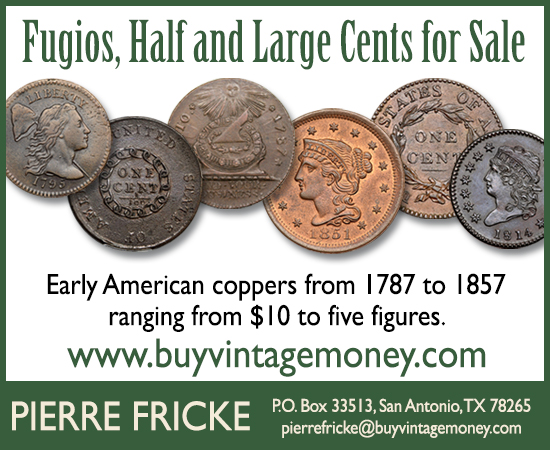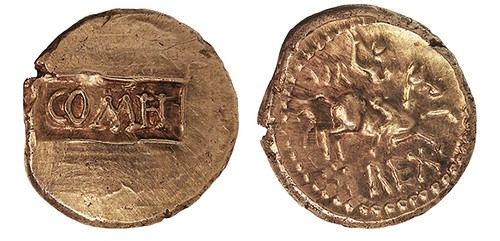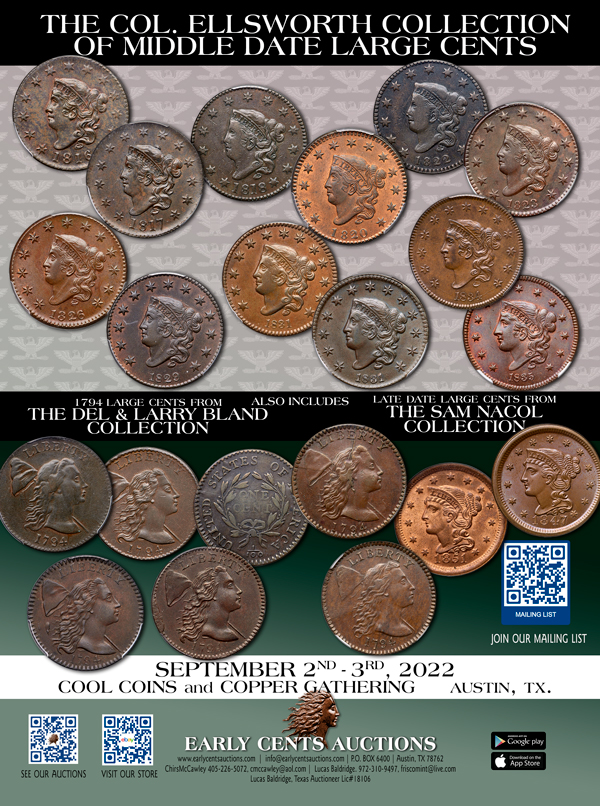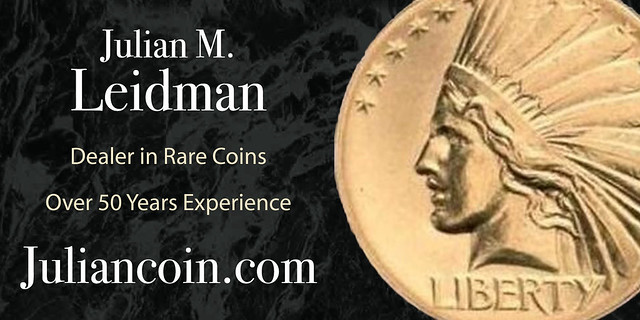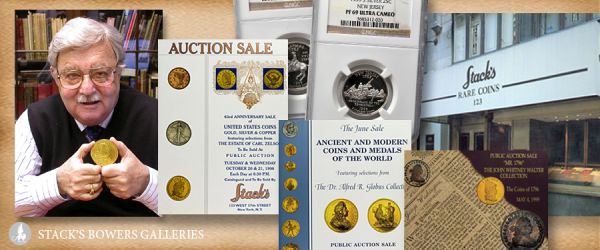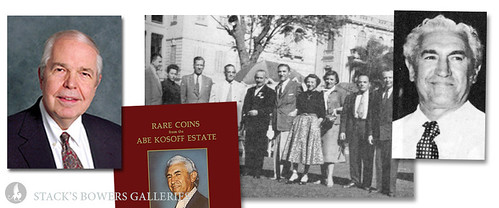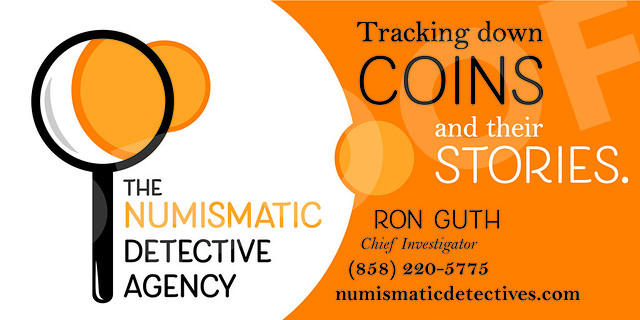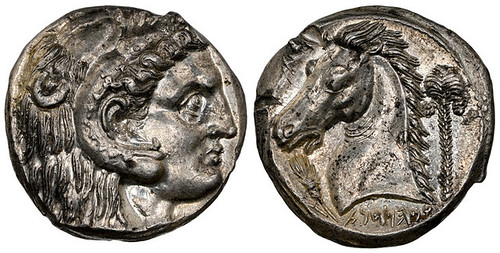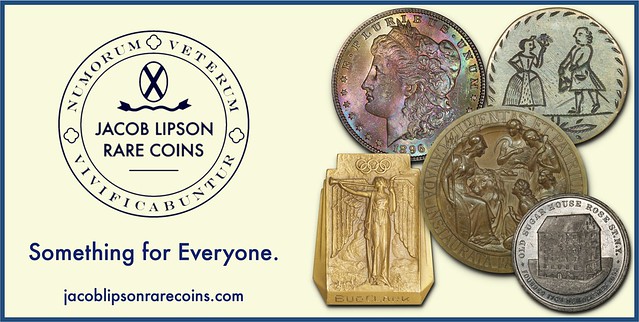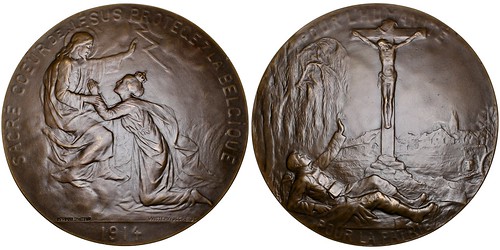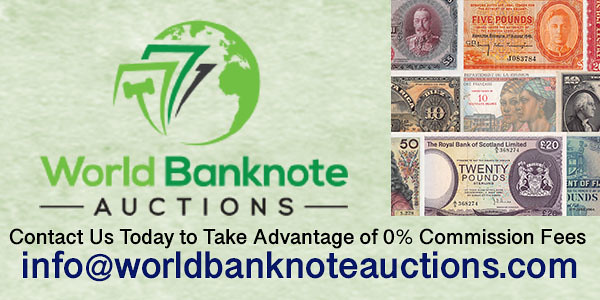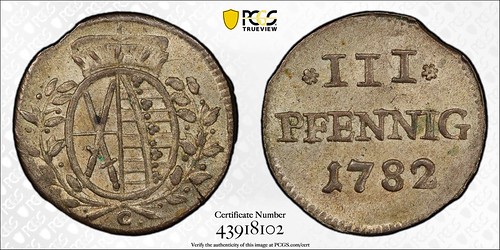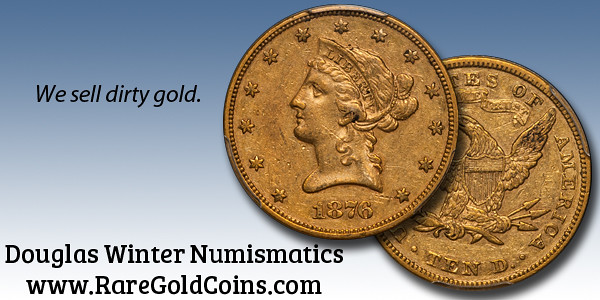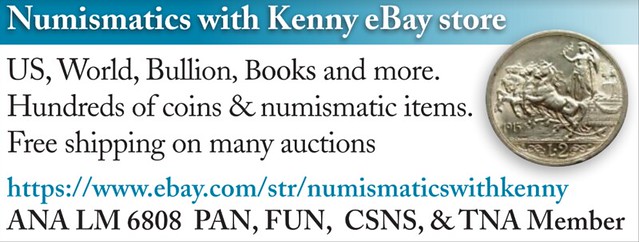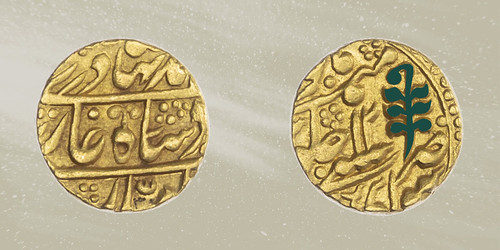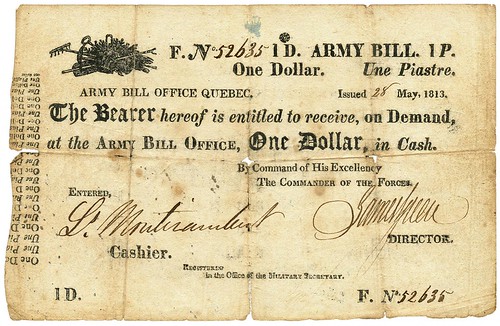
Visit our NBS Sponsors


About UsThe Numismatic Bibliomania Society is a non-profit association devoted to the study and enjoyment of numismatic literature. For more information please see our web site at coinbooks.org SubscriptionsThose wishing to become new E-Sylum subscribers (or wishing to Unsubscribe) can go to the following web page link MembershipThere is a membership application available on the web site Membership Application To join, print the application and return it with your check to the address printed on the application. Print/Digital membership is $40 to addresses in the U.S., and $60 elsewhere. A digital-only membership is available for $25. For those without web access, write to: Charles Heck, Treasurer AsylumFor Asylum mailing address changes and other membership questions, contact Chuck at this email address: treasurer@coinbooks.org SubmissionsTo submit items for publication in The E-Sylum, write to the Editor at this address: whomren@gmail.com BUY THE BOOK BEFORE THE COINSale Calendar |
- WAYNE'S WORDS: THE E-SYLUM AUGUST 7, 2022
- 2022 NBS BENEFIT AUCTION
- KOLBE & FANNING 2022 SUMMER AMERICANA SALE
- NEW BOOK: HALF CENTS 1793-1857 VARIETY GUIDE
- NEW BOOK: HALF DOLLARS 1794-1807 VARIETY GUIDE
- NEW BOOK: BAD METAL: SILVER 3 TO 25 CENTS
- NEW BOOK: PARKS IN YOUR POCKETS
- NEW BOOK: TREASURE ROOM OF THE SAKRA KING
- FALL NEW HAMPSHIRE BOOK SIGNING EVENT
- NNP ADDS ORIGINAL HOBO NICKEL SOCIETY
- VIDEO: MAY 2022 PAN COIN SHOW BANQUET
- DELUXE EDITIONS OF MOULTON BOOK ON VOIGT
- 1785 CONTINENTAL DOLLAR SALE IN NUREMBERG
- NEWSLETTER EDITORS GROUP TO MEET AT ANA
- COLLECTOR EXHIBITS AT THE 2022 CHICAGO ANA
- NOTES FROM E-SYLUM READERS: AUGUST 7, 2022
- JOSEPH WRIGHT OF BORDENTOWN, NEW JERSEY
- MCNALLY FAIRBANKS COIN SCALES
- ANTIQUARIAN BOOKS IN NUMISMATIC STUDIES
- VOCABULARY TERM: LETTERING
- BURTON HAROLD HOBSON
- HARVEY STACK'S NUMISMATIC FAMILY, PART 127
- DEALER ABE KOSOFF
- ATLAS NUMISMATICS AUGUST 2022 SELECTIONS
- NUMISMAGRAM MEDAL SELECTIONS: AUGUST 7, 2022
- NUMISMATIC NUGGETS: AUGUST 7, 2022
- PATTERN COINS OF CENTRAL AND SOUTH AMERICA
- THE MEANING OF PLANTS ON WORLD COINS
- CANADA'S ARMY BILLS: FUNDING THE WAR OF 1812
- THE BIRDS OF CANADA BANK NOTES
Click here to read the thin version on the web
Click here to subscribe
Click here to access the complete archive
To comment or submit articles, reply to whomren@gmail.com
Content presented in The E-Sylum is not necessarily researched or independently fact-checked, and views expressed do not necessarily represent those of the Numismatic Bibliomania Society.
WAYNE'S WORDS: THE E-SYLUM AUGUST 7, 2022
 New subscribers this week include:
Clifford Cooper.
Welcome aboard!
New subscribers this week include:
Clifford Cooper.
Welcome aboard!
Thank you for reading The E-Sylum. If you enjoy it, please send me the email addresses of friends you think may enjoy it as well and I'll send them a subscription. Contact me at whomren@gmail.com anytime regarding your subscription, or questions, comments or suggestions about our content.
This week we open with two numismatic literature sales, five new books, updates from the Newman Numismatic Portal, and more.
Other topics this week include Hobo Nickels, circulating counterfeit coins, new thoughts on the Continental Dollar, announcements for the upcoming ANA convention, coin scales, Burt Hobson, Harvey Stack, Abe Kosoff, auction and fixed price highlights, pattern coins of South and Central America, plants on coins, and Canada's Army Bills.
To learn more about the first six volumes of The Numismatist, the Numismatic Pilot, national park quarters, Tom Uram, Joseph Reakirt, Joseph Wright, the Invisible Coinage of Verica, coin and medal lettering, the Ghent Imitation Noble, the Saviours of Liberty medal, and the the Birds of Canada bank note series, read on. Have a great week, everyone!
Wayne Homren
Editor, The E-Sylum
2022 NBS BENEFIT AUCTION
Every year at the ANA convention, our sponsor NBS holds an auction of donated material to raise funds for the club. Bidding is open to all, and you needn't attend in person. Check out the catalog - there is some great material here, thanks to our generous donors. Pitch in as a generous bidder! -Editor
Each year at the ANA World's Fair of Money, the Numismatic Bibliomania Society conducts a charity auction to raise funds for the organization. All items sold are donated to the NBS by members and 100% of the proceeds go to the NBS treasury.
KOLBE & FANNING 2022 SUMMER AMERICANA SALE
Kolbe & Fanning are holding a Summer Americana sale of numismatic literature. Here's the announcement. Great material! -Editor
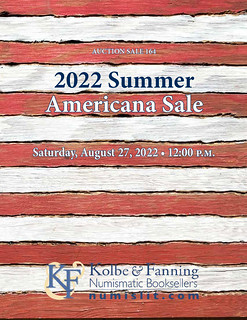 Kolbe & Fanning Numismatic Booksellers are happy to announce that we will be holding a Summer Americana sale on Saturday, August 27, 2022. The sale features highlights from the Cardinal Collection Library of American numismatic auction catalogues, the Bourne Library of U.S. numismatic periodicals, and a number of other important American works on coins and related subjects. While the focus of the sale is on Americana, this includes American items featuring ancient and foreign coins, making for a sale that includes something for everybody.
Kolbe & Fanning Numismatic Booksellers are happy to announce that we will be holding a Summer Americana sale on Saturday, August 27, 2022. The sale features highlights from the Cardinal Collection Library of American numismatic auction catalogues, the Bourne Library of U.S. numismatic periodicals, and a number of other important American works on coins and related subjects. While the focus of the sale is on Americana, this includes American items featuring ancient and foreign coins, making for a sale that includes something for everybody.
Some highlights of the sale include:
NEW BOOK: HALF CENTS 1793-1857 VARIETY GUIDE
Robert Powers has published a new variety guide for U.S. Half Cents. Like his earlier books, it is available through David Kahn Rare Coins. The book is $95, plus $5 shipping (per order, not per book). -Editor
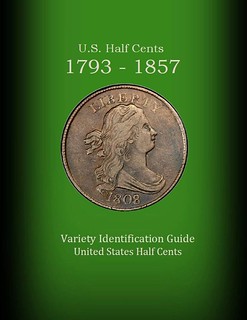 Proudly presented to you is the third volume of a new series of variety identification guides for Early American Copper coins. This volume follows Volumes One and Two (Early and Middle Date Large Cents), and covers all of the Cohen varieties for the entire Half Cent series, 1793-1857.
Proudly presented to you is the third volume of a new series of variety identification guides for Early American Copper coins. This volume follows Volumes One and Two (Early and Middle Date Large Cents), and covers all of the Cohen varieties for the entire Half Cent series, 1793-1857.
Inside, you will find a collection of the highest quality, full color, high resolution modern photos available anywhere, which will make attributing your Half Cents easier than ever before. Careful attention to detail was considered in the selection of these photos for only those which show the greatest of useful detail in helping with your attribution.
You will also find die state photos and information inside, whether the die state is important to making the coin easier to attribute or is important from a monetary value standpoint.
NEW BOOK: HALF DOLLARS 1794-1807 VARIETY GUIDE
Robert Powers also published a new variety guide for early U.S. Half Dollars, and it is available through David Kahn Rare Coins for $95 each, plus $5 shipping (per order, not per book). The images are large size and high resolution. -Editor
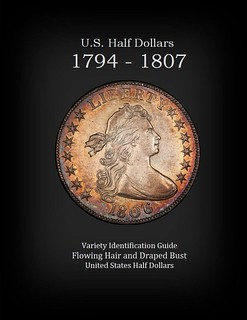 Proudly presented to you is the 4th Volume of a series of variety identification guides covering Early U.S. Coins. This volume follows Volumes 1 and 2 (Early and Middle Date Large Cents), Volume 3 (Half Cents), and covers all of the Overton varieties for the entire Flowing Hair series (1794-1795), as well as the Draped Bust series (1796-1807) of Early U.S. Half Dollars. This volume also precedes a guide for Capped Bust Halves.
Proudly presented to you is the 4th Volume of a series of variety identification guides covering Early U.S. Coins. This volume follows Volumes 1 and 2 (Early and Middle Date Large Cents), Volume 3 (Half Cents), and covers all of the Overton varieties for the entire Flowing Hair series (1794-1795), as well as the Draped Bust series (1796-1807) of Early U.S. Half Dollars. This volume also precedes a guide for Capped Bust Halves.
The primary purpose of this guide is rapid variety identification – while other publications are excellent for inviting in depth home study, this guide is perfect for portability, heavy on-the-go usage, and quick attribution.
The author of this book has had a strong interest in Early U.S. coins for over 30 years. He set out to write this series of books because he has wanted to read them for many years, and finally gave up on waiting for someone else to write them.
NEW BOOK: BAD METAL: SILVER 3 TO 25 CENTS
Winston Zack's 2019 book on circulating contemporary counterfeit coins covered copper and nickel coins. It was the first in a planned multi-part series. Here's the press release for the second volume, covering silver denominations from 3 to 25 cents. -Editor
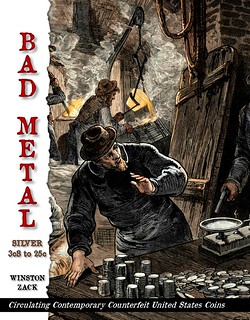 After more than 8 years of diligent
research, study, and documentation, the second book in Winston Zack's award-winning,
four-part Bad Metal book series of circulating contemporary counterfeit U.S. coins, Bad
Metal Silver. 3cS to 25c, will be printed this Fall.
After more than 8 years of diligent
research, study, and documentation, the second book in Winston Zack's award-winning,
four-part Bad Metal book series of circulating contemporary counterfeit U.S. coins, Bad
Metal Silver. 3cS to 25c, will be printed this Fall.
Bad Metal Silver. 3cS to 25c covers counterfeit silver denominations including three cent silvers (3cS), half-dimes, dimes, twenty cents, and quarters from the Bust, Seated, Barber, Renaissance, and Presidential series. This 250+ page, professionally photographed, full-color book documents more than 240 die-struck counterfeit coins along with dozens of cast counterfeits with most varieties having never been previously published. Counterfeit families of related varieties are carefully assembled with close-up pick-up-point images. And where larger families of similar looking varieties are concerned, a quick attribution guide was created in order to make identification of varieties easier and faster.
NEW BOOK: PARKS IN YOUR POCKETS
The ANA has published a new book on the national park quarters. -Editor
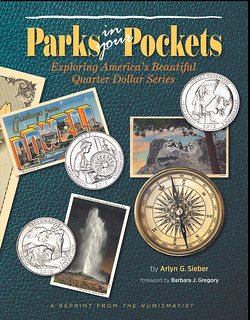 Parks in Your Pockets. Exploring America's Beautiful Quarter Dollar Series.
Parks in Your Pockets. Exploring America's Beautiful Quarter Dollar Series.
Fans of the United States Mint's 11-year program of America the Beautiful Quarters®, struck from 2010 to 2021, will be delighted by Arlyn G. Sieber's new book, Parks in Your Pockets, newly published by the American Numismatic Association. The lavishly illustrated, 120-page, softcover volume features 56 chapters based on his popular series of articles in The Numismatist and includes a foreword by former Numismatist Editor-in-Chief Barbara J. Gregory.
NEW BOOK: TREASURE ROOM OF THE SAKRA KING
The ANS has published a new book on the votive coinage from Gandharan Shrines. -Editor
In the Treasure Room of the Sakra King: Votive Coinage from Gandharan Shrines
[Hardback]
Waleed Ziad(Author)
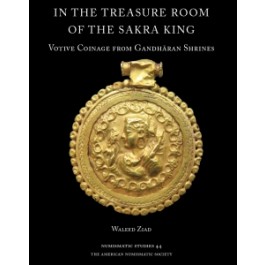 ISBN: 9780897223676
ISBN: 9780897223676
Published by: American Numismatic Society
Series: Numismatic Studies
Volume: 44
Year of Publication: 2022
240p
H11 x W8.5
In a lush valley within the Sakra peak in Gandhara (northwestern Pakistan) is a vast limestone cave temple, part of an ancient Hindu sacred complex. For over 700 years, this cluster of shrines minted hundreds of varieties of their own votive coinage – a unique case in Central and South Asia. These were miniscule copper coins, issued for pilgrims, featuring eclectic and original combinations of Greco-Roman, Iranian, Indic, and Islamic iconography. This book examines the native Sakra copper coinage issued from circa 550 to 1100, corresponding to the Nezak, Turk Shahi, Hindu Shahi, and Ghaznavid dynasties. These coins provide a window into what may have been an ecclesiastical administration exercising varying degrees of autonomy throughout its lifetime. They practically blur boundaries between vernacular folk art and monetary instruments serving political or confessional agendas.
FALL NEW HAMPSHIRE BOOK SIGNING EVENT
NENA is sponsoring a numismatic book signing event this fall with several authors. John Ferreri passed along this announcement. -Editor
Sponsored by the New England Numismatic Association.
NNP ADDS ORIGINAL HOBO NICKEL SOCIETY
The latest additions to the Newman Numismatic Portal are from the Original Hobo Nickel Society. Project Coordinator Len Augsburger provided the following report. -Editor
Original Hobo Nickel Society Publications on Newman Portal
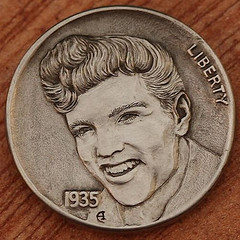 A selection of publications from the Original Hobo Nickel Society are now available on Newman Portal, including issues of their newsletter (Bo Tales) and early auction catalogs of this specialty organization. The Original Hobo Nickel Society was founded in 1992 and encourages the research, collecting, and creation of
A selection of publications from the Original Hobo Nickel Society are now available on Newman Portal, including issues of their newsletter (Bo Tales) and early auction catalogs of this specialty organization. The Original Hobo Nickel Society was founded in 1992 and encourages the research, collecting, and creation of hobo nickels,
which are post-Mint carved Buffalo nickels. Newman Portal acknowledges Ralph Winter, Bo Tales editor, for his assistance with this title.
Image: Elvis Presley, carved on the obverse of a Buffalo nickel, created by Aleksey Saburov
VIDEO: MAY 2022 PAN COIN SHOW BANQUET
These are selections from the David Lisot Video Library that feature news and personalities from the world of coin collecting. David has been attending coin conventions since 1972 and began videotaping in 1985. The Newman Numismatic Portal now lists all David's videos on their website at:
https://nnp.wustl.edu/library/multimediadetail/522852
Here's one on the May 2022 PAN Coin Show Banquet. -Editor
Tom Uram Hosts PAN Coin Show Banquet 2022.
VIDEO: 51:12
Tom Uram, President, Pennsylvania Association of Numismatists
David Lisot, Video Producer, Coin Television.com.
DELUXE EDITIONS OF MOULTON BOOK ON VOIGT
David Fanning of Kolbe & Fanning Numismatic Booksellers writes:
"The timing of the recent questions about the planned deluxe edition of Karl Moulton's book on Henry Voigt is fortuitous. By coincidence, we had just been shipped a number of boxes of these undistributed volumes, and we will be ready to offer them in the near future.
"While I do not know the background on these in its entirety, I can say that the books exist in quarto format, and are a large-paper edition (that is, the text block is the same as in the octavo trade edition) bound in white or brown processed leather. They are gilt-stamped on the front cover and spine and come in a variety of colors of marbled endpapers. The Cardinal Collection Educational Foundation underwrote the production of these special editions, but the books remained undistributed for reasons unknown to me. Further information will be available soon. In the meantime, two copies of the book are included in our Sale 165 as lots 321 and 322:"
Thanks, that's great news. -Editor
1785 CONTINENTAL DOLLAR SALE IN NUREMBERG
Julia Casey submitted these additional research notes on the 1785 Continental Dollar Sale in Nuremberg. Thank you! More pieces to the puzzle of the origin of the Continental Dollar coins/medals. -Editor
Michael von Seufferheld and the 1785 Continental Dollar Sale in Nuremberg
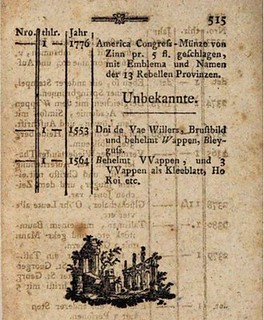 The 1785 catalog for the von Seufferheld collection is the earliest documented sale of a
The 1785 catalog for the von Seufferheld collection is the earliest documented sale of a Continental dollar.
This sale has been used by proponents on both sides of the debate to support their theories about the origin and intent for the minting of the Continental dollar
pieces. The traditional concept that the Continental dollar
was issued as an American dollar is supported by the catalog description of the piece as munze
i.e., a coin. As well, a Continental dollar
first being offered for sale in Germany supports the more recent perception that these pieces were struck in Europe.
The owner of this collection is identified as Michael von Seufferheld by Joachim Rex in Beiträge zum Buch- und Bibliothekswesen (Contributions to Books and Libraries), Volume 44 (2002). Johann Michael von Seufferheld (1728-1784) was a banker and commercial court assessor in Nuremberg and received an Adelsbrief
or nobility status in Vienna in 1771. While his full given name includes Johann,
von Seufferheld was commonly listed in literature and records as Michael von Seufferheld.
NEWSLETTER EDITORS GROUP TO MEET AT ANA
This announcement appeared in the August 2022 issue of the E-Gobrecht from the Liberty Seated Collectors Club. Great project! -Editor
Fellow Newsletter Editors for all Local Coin Clubs:
My experience with coin clubs from around the country has reinforced the view that club newsletters provide a cohesive element for club functioning.
COLLECTOR EXHIBITS AT THE 2022 CHICAGO ANA
The upcoming American Numismatic Association World's Fair of Money® will feature a full range of exhibits. Paul Hybert of the Chicago Coin Club submitted this report. Thanks - the exhibit area is one of my favorite parts of every convention. -Editor
An online guide to the Collector Exhibit Area at the 2022 World's Fair of Money is available online at: http://www.chicagocoinclub.org/events/2022/ana/ex/all_by_cl.html .
The Collector Exhibits are no longer listed in the Show Guide. The above guide groups the exhibits by Exhibit Class, while the ANA website has one listing of all exhibits at https://www.money.org/wfm/exhibit-descriptions .
NOTES FROM E-SYLUM READERS: AUGUST 7, 2022
More on Collecting U.S. Treasury Checks
Norm Cochrane writes:
"Because of the article in the July 31st issue of The E-Sylum, I am confessing to not cashing a Treasurer of the U.S. check. The check No. 99,923,506 for $1.00 is dated 10/19/73 and directly below the date is CCDOLLAR
. The $1.00 is the excess over the minimum bid price for an 1884 CC silver dollar which I still have. Therefore I have a silver and a paper
Carson City dollar."
Thank you! This is great numismatic ephemera. -Editor
To read the earlier E-Sylum article, see:
NOTES FROM E-SYLUM READERS: JULY 31, 2022 : Uncle Sam's Free Numismatic Collectibles
(https://www.coinbooks.org/v25/esylum_v25n31a09.html)
Other topics this week include collector Joseph Reakirt, 1793 U.S. coin errors, and Indian Peace Medal recipients. -Editor
JOSEPH WRIGHT OF BORDENTOWN, NEW JERSEY
Mike Costanzo submitted this note about U.S. Mint engraver Joseph Wright and other luminaries of Bordentown, New Jersey. Thanks! -Editor
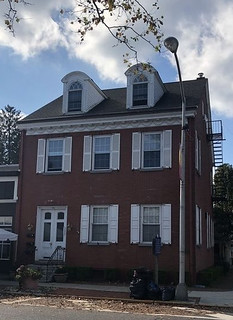 Joseph Wright was considered the first chief engraver of the U.S. Mint by many, although he died before he was officially confirmed. Wright was born in Bordentown, New Jersey, which was located next to the small town of Groveville, where I grew up and started collecting as a youngster. A recent search for any Wright-associated landmarks in Bordentown turned up Wright's childhood home, which still stands. Surprisingly, Wright was not given top billing. This went to his mother, Patience, who was an accomplished sculptor as well as a "female spy". On a metal sign outside of the house, Joseph is noted only as a "noted painter." A small bronze plaque attached to the home, however, duly notes Wright as the "Designer of Original U.S. Coins."
Joseph Wright was considered the first chief engraver of the U.S. Mint by many, although he died before he was officially confirmed. Wright was born in Bordentown, New Jersey, which was located next to the small town of Groveville, where I grew up and started collecting as a youngster. A recent search for any Wright-associated landmarks in Bordentown turned up Wright's childhood home, which still stands. Surprisingly, Wright was not given top billing. This went to his mother, Patience, who was an accomplished sculptor as well as a "female spy". On a metal sign outside of the house, Joseph is noted only as a "noted painter." A small bronze plaque attached to the home, however, duly notes Wright as the "Designer of Original U.S. Coins."
MCNALLY FAIRBANKS COIN SCALES
Malcolm Mathias of Forest Hill, Victoria, Australia writes:
"I am researching all the different versions of the McNally Fairbanks counterfeit coin detectors with the intention of eventually publishing a detailed article describing and cataloguing all the different versions for the collectors out there – both numismatists and scale collectors, and those that do both. I have reached a point where I need to reach out for other examples and other information from other collectors."
This is a great companion topic for the just-announced book by Winston Zack on counterfeits of U.S. coins. Scales like these were how merchants of the day identified the fakes that came into their shops. -Editor
ANTIQUARIAN BOOKS IN NUMISMATIC STUDIES
Bob Van Arsdell published a new article with a warning about using antiquarian books for numismatic studies. -Editor
Bob writes:
"It took 250 years to identify the coins of an Ancient British king because an erroneous image from 1610 was copied over and over. The king's coinage could have been identified immediately, but repeated scholarly errors made it invisible
to the public. It's gives us a warning that working from images, rather than the coins themselves, carries risks for numismatic researchers."
VOCABULARY TERM: LETTERING
Here's another entry from Dick Johnson's Encyclopedia of Coin and Medal Terminology. I added the medal image. -Editor
Lettering. The wording on coins and medals, often highly abbreviated. There are two kinds of lettering, those that follow the perimeter of the item – the legend – usually in an arc base line (called bowed), and all other lettering, the inscription. Lettering did not appear on the first coins of Lydia (in 640 bc), but appeared shortly thereafter, about 580 bc. It has been a necessary element of coin and medal design ever since.
THE BOOK BAZARRE
BURTON HAROLD HOBSON
American Numismatic Biographies author Pete Smith submitted this article on author Burton Hobson. Thanks! -Editor
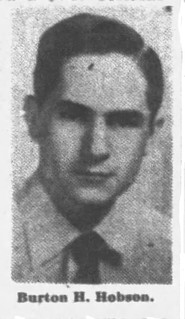 When Fred Reinfeld died at age 54 in 1964, Burt Hobson took over as the writer of books for
numismatic novices.
When Fred Reinfeld died at age 54 in 1964, Burt Hobson took over as the writer of books for
numismatic novices.
Burt Hobson was born in Galesburg, Illinois, on April 16, 1933, the son of Burt (1909-1985) and Geneva Sornberger Hobson (1908-2003). His father was an electrical supplies salesman.
Hobson married Maxine C. Meyer on August 9, 1953. They had a daughter and two sons.
Hobson was an outstanding student in high school and won a partial scholarship to the University of Chicago at age 17. After completing his junior year at Rock Island High School in 1950, he was admitted as an early entry to the University of Chicago. He received a B. A. from the University of Chicago in 1953.
HARVEY STACK'S NUMISMATIC FAMILY, PART 127
Stack's Bowers has a backlog of the late Harvey Stack's numismatic memoir articles. In this one Harvey completes the year 1999. -Editor
The year 1999 was the final installment of his Numismatic Family story that Harvey G. Stack submitted before he passed away in January 2022. We at Stack's Bowers Galleries will miss him greatly, not just for his exuberant personality and welcoming presence, but we will also miss his many stories of the nearly three-quarters of a century he spent in the numismatic hobby.
Stack's auction season in 1999 would offer nine separate catalogs that brought to market United States and world coins, including some very important name collections.
DEALER ABE KOSOFF
Last week, Stack's Bowers published a Dave Bowers blog article on Abe Kosoff. -Editor
Abraham Kosoff, born in New York City in 1912, gave his name in print as A. Kosoff, and was known to his friends as Abe Kosoff. In September 1929 in New York City he was hired as a clerk by A. Celender to trade in antique jewelry and old coins. Although he had planned to become an accountant, old coins proved to be remunerative, and in 1937 he went full time into professional numismatics, trading as the Numismatic Gallery. Helping him along was Julius Guttag, who during the previous decade had been a partner in Guttag Brothers, stockbrokers, exchange brokers, and rare coin dealers. The Guttags had fallen upon hard financial times, and much of the partnership's inventory was consigned piecemeal to Kosoff. In 1940 his business was conducted in the rear of Alfred Rich & Sons Antique Shop, 122 East 57th Street, New York City.
ATLAS NUMISMATICS AUGUST 2022 SELECTIONS
Atlas Numismatics has updated their website with 376 new coins, medals, and tokens at fixed prices. Selections include the following items. -Editor
Mint State Siculo-Punic Tetradrachm
To read the complete item description, see:
https://www.atlasnumismatics.com/1069941/
NUMISMAGRAM MEDAL SELECTIONS: AUGUST 7, 2022
Numismagram's Jeremy Bostwick forwarded these highlights from his most recent addition of medals to his site. In addition to the pieces below, there are some attractively toned French jetons, some medals pertaining to Japan and the Far East, and some high grade award medals from the St. Louis/Louisiana Purchase World's Fair. For all of the new items from this month, please visit numismagram.com/inventory. -Editor
102156 | BELGIUM. Sacred Heart of Jesus bronze Medal. Issued 1914 (64mm, 82.99 g, 12h). By J. Witterwulghe. SACRE COEUR DE JÉSUS PROTEGEZ LA BELGIQUE, Christ seated right on throne, warding off thunderbolt and blessing a female personification of Belgium kneeling left / POUR L'HUMANITÉ / POUR LA PATRIE, fallen Belgian soldier reclining right, reaching out to figure of Christ crucified upon the cross at a distance. Edge: Plain. Choice Mint State. Pleasing brown surfaces, with a light matte nature. $245.
NUMISMATIC NUGGETS: AUGUST 7, 2022
Here's a selection of interesting or unusual items I came across in the marketplace this week. Tell us what you think of some of these. -Editor
SAXONY: Friedrich August III, 1763-1806, AR 3 pfennig, Dresden, 1782-C, KM-965, Buck-149c, Kahnt-1136, a wonderful mint state example! PCGS graded MS64.
Something about this caught my eye, and I guess I'm not quite sure what it is. A crude-looking piece for the year. That third Roman numeral is out of line - was that a single-character punch? From the Stephen Album Rare Coins Internet Auction 17. -Editor
To read the complete lot description, see:
124 SAXONY: Friedrich August III, 1763-1806, AR 3 pfennig, Dresden, 1782-C, PCGS MS64
(https://www.sarc.auction/SAXONY-Friedrich-August-III-1763-1806-AR-3-pfennig-Dresden-1782-C-PCGS-MS64_i45731457)
Other topics this week include an 1851-D Gold Dollar, an 1819/8 Half Dollar, and a Daniel Morgan at Cowpens medal. -Editor
PATTERN COINS OF CENTRAL AND SOUTH AMERICA
A Stack's Bowers blog article by Jeremy Bostwick examines pattern coins of Central and South America from the Pat Johnson Collection. -Editor
As various emerging states in Central and South America began to break free from their colonial yokes and establish themselves as independent in the first half of the 18th century, a sense of pride and nationalism understandably went hand in hand. One of the best representatives of this fervor was the coinages struck by these nations. Exchanging the portraits of a faraway king (whose actual countenance may have been known only through a sketch), these fledgling nations instead chose more local motifs. Many of these designs took the form of coats-of-arms that drew upon iconography and symbolism key to each nation, reinforcing to the populace that their land was now free.
THE MEANING OF PLANTS ON WORLD COINS
A recent blog article by Baldwin's World Coin Expert Ema Sikic covers an interesting topic: the meaning of plants on world coins. Here's an excerpt - see the complete article online. -Editor
Many spectacular world coins feature an array of plants, but why does this iconography hold such significance? Today we look at five coins and the meaning behind the plants that are depicted on them.
COINS OF JAIPUR – JHAR LEAF
Jhar leaf is one of the most recognizable symbols on Indian coins and it appears on gold, silver and copper coinage of various Princely States. Most notably, it is a symbol of the Princely State of Jaipur and Jaipur mint. It appears on coins of Jaipur with a bud on top is the symbol of the Jaipur mint, which was adopted by the state of Kishangarh as well.
THE BOOK BAZARRE
CANADA'S ARMY BILLS: FUNDING THE WAR OF 1812
The Bank of Canada Museum published an article on the "Army Bills" printed to help fund the War of 1812. -Editor
War requires funds for supplies, resources and soldiers' pay. Able-bodied men are taken from the workforce. It's a heavy burden for a country and adds stress to an economy. For British North America in early 1812, the coming war posed a challenge on all these fronts.
THE BIRDS OF CANADA BANK NOTES
Another Bank of Canada Museum article discusses technical aspects of the Birds of Canada bank note series. Here's an excerpt. -Editor
Birds have appeared on currency for two millennia. And today, a number of nations feature birds on every one of their bank notes. But type birds on bank notes
into a search engine and what flies to the top? The Birds of Canada series of 1986.

